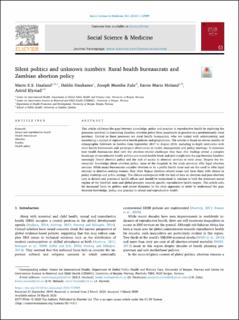| dc.contributor.author | Haaland, Marte Emilie Sandvik | |
| dc.contributor.author | Haukanes, Haldis | |
| dc.contributor.author | Zulu, Joseph | |
| dc.contributor.author | Moland, Karen Marie | |
| dc.contributor.author | Blystad, Astrid | |
| dc.date.accessioned | 2021-02-11T08:46:15Z | |
| dc.date.available | 2021-02-11T08:46:15Z | |
| dc.date.created | 2020-03-16T15:24:33Z | |
| dc.date.issued | 2020 | |
| dc.Published | Social Science and Medicine. 2020, 251, 112909. | en_US |
| dc.identifier.issn | 0277-9536 | |
| dc.identifier.uri | https://hdl.handle.net/11250/2727320 | |
| dc.description.abstract | This article addresses the gaps between knowledge, policy and practice in reproductive health by exploring the processes involved in translating Zambian abortion policy from paperwork to practice in a predominantly rural province. Central to these processes are rural health bureaucrats, who are tasked with administering and monitoring a myriad of reproductive health policies and programmes. The articles is based on eleven months of ethnographic fieldwork in Zambia from September 2017 to August 2018, including in-depth interviews with rural health bureaucrats and participant observation in health management and policy meetings. It examines how health bureaucrats deal with the abortion-related challenges they face. Our findings reveal a complex landscape of reproductive health politics and moral double-binds and give insight into the gap between Zambia's seemingly liberal abortion policy and the lack of access to abortion services in rural areas. Despite the bureaucrats' knowledge about abortion policy, none of the hospitals in the study province offer legal abortion services. While many bureaucrats consider abortion to be a public health issue and see the need to offer legal services to abortion-seeking women, they often bypass abortion-related issues and treat them with silence in policy meetings and public settings. The silence corresponds with the lack of data on abortion and post-abortion care in district and provincial health offices and should be understood in relation to both the dominant moral regime of the Zambian state and global pressure towards specific reproductive health targets. This article calls for increased focus on politics and power dynamics in the state apparatus in order to understand the gaps between knowledge, policy and practice in sexual and reproductive health. | en_US |
| dc.language.iso | eng | en_US |
| dc.publisher | Elsevier | en_US |
| dc.rights | Navngivelse 4.0 Internasjonal | * |
| dc.rights.uri | http://creativecommons.org/licenses/by/4.0/deed.no | * |
| dc.title | Silent politics and unknown numbers: Rural health bureaucrats and Zambian abortion policy | en_US |
| dc.type | Journal article | en_US |
| dc.type | Peer reviewed | en_US |
| dc.description.version | publishedVersion | en_US |
| dc.rights.holder | Copyright 2020 The Authors. | en_US |
| dc.source.articlenumber | 112909 | en_US |
| cristin.ispublished | true | |
| cristin.fulltext | original | |
| cristin.qualitycode | 2 | |
| dc.identifier.doi | https://doi.org/10.1016/j.socscimed.2020.112909 | |
| dc.identifier.cristin | 1801884 | |
| dc.source.journal | Social Science and Medicine | en_US |
| dc.source.40 | 251 | en_US |
| dc.identifier.citation | Social Science and Medicine. 2020, 251, 112909. | |

